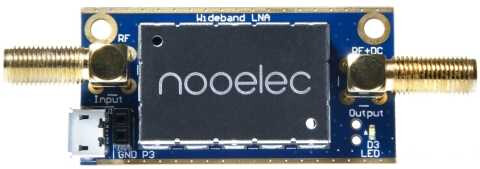I would be interested to know of the LNA’s that others are using for SatNOGS observations - VHF and UHF?
I am using a QFH for VHF and a Turnstile for UHF.
Thanks in advance.
I have tried a lot from https://gpio.com/ and all work pretty well.
Many thanks @pierros. Ordered one from them: 433 MHz Filtered Low Noise Amplifier LNA with 20 dB Gain to hopefully help with some noisy problems here.
73
Its worth pointing out that if there is a LNA before the filter (e.g. between the filter and the antenna) then you may end up with more problems. The ‘433 MHz Filtered Dual Low Noise amp’ from gpio.com is like that ( 433 MHz Filtered Dual Low Noise Amplifier LNA with 40 dB Gain – GPIO LABS ) - AMP → Filter → AMP. The fact that they don’t provide any information IIP3 (or even what amplifier they are using) is a big flashing warning sign to me.
If your issue is strong local signals (and it looks like it might be) then that first (unprotected) amplifier has the potential to go straight into saturation, and produce lots of Intermodulation products which will end up in the passband of the following filter, then get amplified yet again by the final amplifier. Bad situation.
If your issue really is with strong local signals, then the best approach is to put a bandpass filter (e.g. 433 MHz Bandpass Filter Band Pass with 5 MHz Bandwidth – GPIO LABS ) between your antenna and any LNA you use. With this scenario your system noise figure will be limited to the insertion loss of the filter, but if it’s that or getting your entire system wiped out with intermodulation products, I know what I’d be choosing.
Thanks for your observations and advice, Mark @vk5qi .
The LNA I have ordered yesterday before receiving your message is the 433-mhz-filtered-low-noise-amplifier-lna-20-db - GPIO Labs
I have also now ordered the 433 MHz Bandpass Filter Band Pass with 5 MHz Bandwidth to give me some options to ‘play’ with.
It hadn’t escaped my notice that GPIO offer very little information about their products but I was recommended to GPIO by @pierros so thought I would give them a try.
I’ll post my findings in due course when the items have been received and tried.
Thanks again.
UHF station 216 has used this one for years: https://www.minikits.com.au/components/amplifier-modules/PGA-103-UHF-R2 – and enjoying the selections at gpio.com also 
All of @vk5qi’s advice is solid.
For LNAs, this can be a nice construction project. W6PQL will assemble and test an LNA for $21 or supply a blank PCB for $4. You would have to put it in a box with connectors of course.
https://www.w6pql.com/parts_i_can_provide.htm#hf356
Down East Microwave will sell you the PCB, a kit or a complete kit with a box:
https://www.downeastmicrowave.com/category-s/1849.htm
73
Chris
Hi. On my side. A pga103
m0roj,
I realize your posting questions on LNA’s was a couple of years ago, but I just stumbled on it today… I am in need of better a better LNA and I am wondering what your experience has been with the two devices you picked from GPIO Labs? I at this moment has the same two items and getting ready to hit the pay now button. And I got to thinking … “I hope these work” Figured I would give you a shout out to see what you thought…? Thank you in advance!!
Hello Jeff. You can’t go wrong with GPIO Labs products for quality and for doing what it says on the tin. Especially when comparing with some of the Chinese knock-offs. Nooelec also offer some decent LNA’s, which are worth considering. None of them break the banks
These are also working pretty well

Yes I agree. Although I prefer the ‘canned’ option as it reduces extraneous noise from the shack and immediate surroundings. The caution about only using one power source should be particularly observed and so I prefer Bias-T. If using the micro-USB or DC power inputs, then the power source should be taken from the same as the SDR/RasPi. Not an autonomous external supply.
Thanks some great advice.
I never use the USB power option, a remote Bias-T for the power supply and try to keep that DC as clean as possible.
Thanks to you all for some good advice!! I want my reception as strong and noise free as possible. (As can be for an omni-directional station)